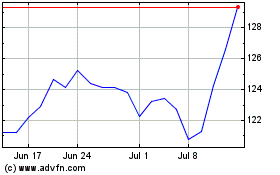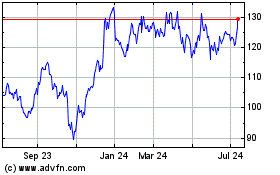Deal Sows Discord at Thomson Reuters -- WSJ
February 16 2018 - 3:02AM
Dow Jones News
By Jacquie McNish and David Wighton
This article is being republished as part of our daily
reproduction of WSJ.com articles that also appeared in the U.S.
print edition of The Wall Street Journal (February 16, 2018).
TORONTO -- The board of Thomson Reuters Corp. recently pressed
ahead with plans to sell a piece of its business to Blackstone
Group LP for $17 billion despite its chairman's concerns that
directors had failed to seek a higher price or consider other
potential buyers, people close to the deal said.
David Thomson, who is board chairman and grandson of Roy
Thomson, the founder of the family empire, began airing his
objections to other directors after the board started to review
Blackstone's offer in November, but most of them disagreed, the
people said. He was also overruled by executives of Woodbridge Co.,
the private Toronto-based holding company through which Mr. Thomson
and other members of Canada's richest family own their 63% stake in
Thomson Reuters, they said.
Mr. Thomson's opposition is the latest instance of discord
between third-generation Thomsons and the professional managers who
oversee core family investments, mainly through Woodbridge. Some of
these managers exert significant control over the family's assets
through a structure, implemented by Mr. Thomson's father before his
death, to safeguard the multibillion-dollar fortune.
Last summer, Blackstone initiated talks to purchase a majority
stake in Thomson Reuters's core financial data business, according
to the people. It was quickly championed by Thomson Reuters CEO Jim
Smith as an opportunity to strengthen the company's core assets,
according to the people.
Mr. Smith was strongly supported by two directors: Woodbridge
CEO David Binet and Ed Clark, who serves as a protector of the
family's intricate web of holding companies and investments that
provide income for dozens of Thomson relatives. Before his death,
Ken Thomson, father of the current chairman, had reorganized the
private family business to create the protector role, usually
filled by an outside adviser.
Kenneth Olisa, a long-serving Thomson Reuters director, resigned
in protest over the Blackstone deal because he shared concerns with
both David Thomson and David's brother and fellow director Peter,
the people said. Some other directors initially expressed concern
that the company did not seek out other buyers to improve the
purchase price, they said.
But a majority of directors of Thomson Reuters ultimately lined
up behind Messrs. Smith, Binet and Clark because they felt the deal
was in the best interest of both the family and minority
shareholders, one person close to the deal said.
Mr. Clark, Mr. Binet and Messrs. Thomson did not respond to
requests for comment. Thomson Reuters declined to comment. A
Blackstone spokesman had no immediate comment Wednesday.
David Thomson ultimately voted for the sale, announced two weeks
ago, along with his brother Peter after it was clear a majority of
directors supported it, according to people close to the deal.
Blackstone's offer for the Thomson Reuters stake is structured as a
binding deal that remains subject to review only by regulators,
people close to the deal said. No shareholder approval is required
and any competing bidder would have to make an offer for all of
Thomson Reuters which would significantly raise the price, the
people said.
Frank Allen, executive director of FAIR Canada, an investor
rights group, said it was "far better to put a transaction to a
market test" than rely on a fairness opinion. Guggenheim Securities
LLC, which advised Thomson Reuters on the sale, also provided a
fairness opinion that the price was reasonable, according to the
people close to the deal.
"It is disappointing in terms of a major transaction of this
scale and complexity that there is no disclosure by Thomson Reuters
regarding the process that the board followed in negotiating,
deliberating and taking advice prior to approving the transaction,"
he said.
Thomson Reuters competes in some businesses with Dow Jones &
Co., a unit of News Corp and publisher of The Wall Street Journal
and Dow Jones Newswires.
David Thomson has had difficult relations with some of the
Thomson Reuters directors in recent years, according to people
close to the company. Tensions boiled over last summer when Mr.
Smith threatened to resign over what he said was Mr. Thomson's
"meddling" in the company. The board backed Mr. Smith, and Mr.
Thomson signed a letter pledging not to interfere in the company's
management, one of the people said.
In 2012, Mr. Thomson pushed out a former CEO of Woodbridge, the
family holding company, amid tensions over Thomson Reuters's
performance. That same year, one of his cousins fired the CEO of an
affiliated family holding company.
On Monday, Thomson Reuters said Mr. Smith had been hospitalized
in Toronto after "feeling unwell." Chief Financial Officer Stephane
Bello will oversee Mr. Smith's responsibilities during his
absence.
Write to Jacquie McNish at Jacquie.McNish@wsj.com and David
Wighton at david.wighton@wsj.com
(END) Dow Jones Newswires
February 16, 2018 02:47 ET (07:47 GMT)
Copyright (c) 2018 Dow Jones & Company, Inc.
Blackstone (NYSE:BX)
Historical Stock Chart
From Mar 2024 to Apr 2024

Blackstone (NYSE:BX)
Historical Stock Chart
From Apr 2023 to Apr 2024
